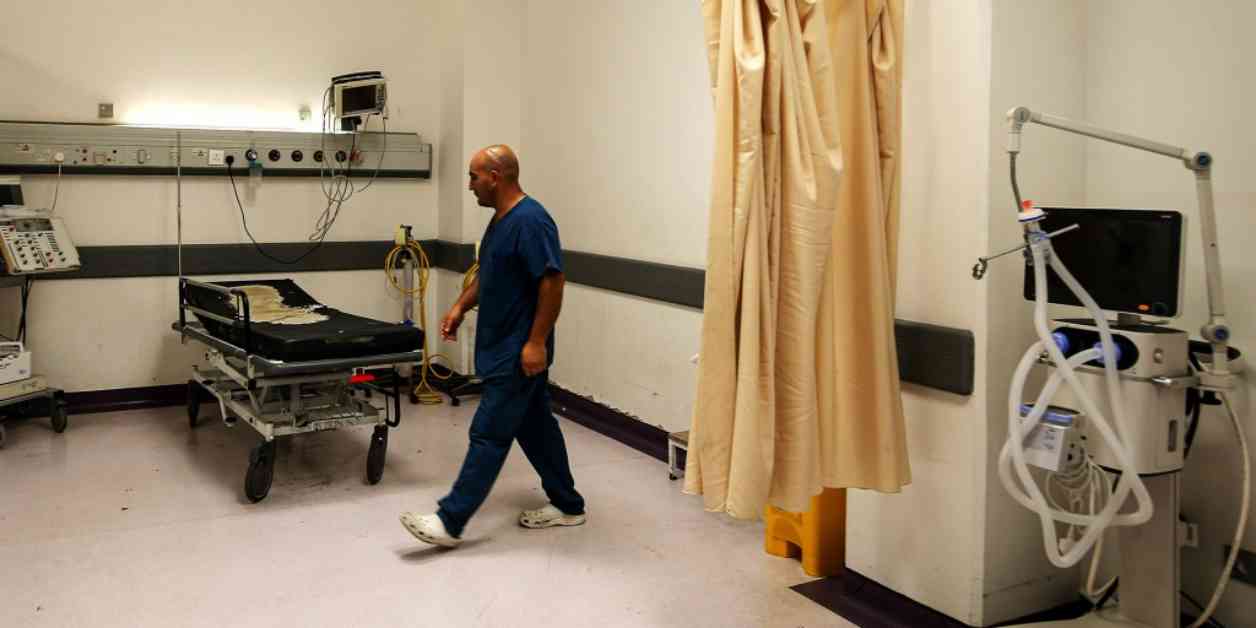Lebanon’s Hospitals Face Challenges in Preparing for Potential War: Crisis Management Efforts
As tensions escalate between Israel and Lebanon’s Hezbollah militant group, hospitals in Lebanon are facing the daunting task of preparing for a potential full-scale war. Dr. Jihad Saadeh, the director of Rafiq Hariri University Hospital, the largest public hospital in Beirut, walks through the facility, highlighting the preparations staff have made in anticipation of the conflict.
Hospital Preparations
Saadeh points to a new triage system that can quickly transport critical patients to high-level care, a newly constructed facility outside the entrance equipped to decontaminate patients exposed to weaponized poisons like white phosphorus, and fresh training initiatives to convert specialized areas such as the dialysis clinic into trauma surgery units at a moment’s notice. Despite these efforts, Saadeh admits that the hospital is not fully prepared for war, estimating that it can only sustain operations for about 10 days before requiring external supplies.
The threat of war has raised concerns about the readiness of Lebanon’s healthcare system to handle a potential crisis. Saadeh attributes the inadequacies in the health system to the country’s broader issues, including an economic crisis, political deadlock, the aftermath of the 2020 Beirut port explosion, the impact of the pandemic, a significant refugee population, and the shadow of the last war with Israel in 2006.
Geopolitical Tensions
The recent assassinations of senior Hezbollah and Hamas figures have further heightened tensions in the region, with both Iran and Hezbollah vowing to retaliate against Israel. The ongoing low-level conflict between Israel and Hezbollah has pushed the Middle East to the brink of war, exacerbating the challenges faced by Lebanon’s healthcare sector.
Firas Maksad, a Lebanese politics expert, highlights the lack of preparedness in Lebanon’s hospitals, clinics, and trauma centers for the impending conflict. The World Health Organization has stepped in to deliver essential medical supplies, including trauma kits, to support the country’s healthcare system in case of a major crisis.
Challenges and Concerns
Lebanon’s government is apprehensive about hospitals and medical personnel becoming targets in the event of a war, similar to the situation in Gaza. While the country’s healthcare sector has shown resilience in the past, the current economic crisis and political instability pose significant challenges to its ability to respond effectively to a major crisis.
Sleiman Haroun, the president of Lebanon’s Syndicate of Hospitals, acknowledges the logistical challenges faced by the healthcare system, including the scarcity of resources like oxygen and electricity. With only one oxygen-bottling plant in the country and frequent power outages due to the failing electrical network, hospitals are forced to rely on fuel-run generators to maintain essential services.
The brain drain phenomenon, which has seen a significant number of skilled medical professionals leaving Lebanon in recent years, further complicates the healthcare system’s ability to respond to emergencies. Health Minister Firas Abiad notes that the exodus of doctors and nurses has strained the healthcare workforce, making it challenging to ensure adequate staffing and resources during times of crisis.
Despite these challenges, Lebanon’s hospitals have demonstrated resilience in the face of adversity. During the COVID-19 pandemic, the healthcare system managed to avoid being overwhelmed, and hospitals efficiently handled the aftermath of the Beirut port explosion, treating thousands of casualties in a short period.
Looking Ahead
As Lebanon braces for the possibility of war with Israel, concerns linger about the country’s ability to withstand a major conflict. The experiences of past conflicts, such as the 2006 war with Israel, have informed preparations in hospitals and healthcare facilities, but the current economic crisis and political instability present significant obstacles to effective crisis management.
The international community, including the World Health Organization, has provided support to Lebanon’s healthcare system, but the sustainability of these efforts remains uncertain. As Lebanon navigates the challenges of an impending conflict, the resilience and dedication of its medical professionals will be crucial in ensuring the well-being of the population during times of crisis.

















